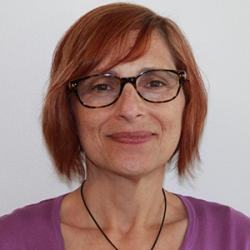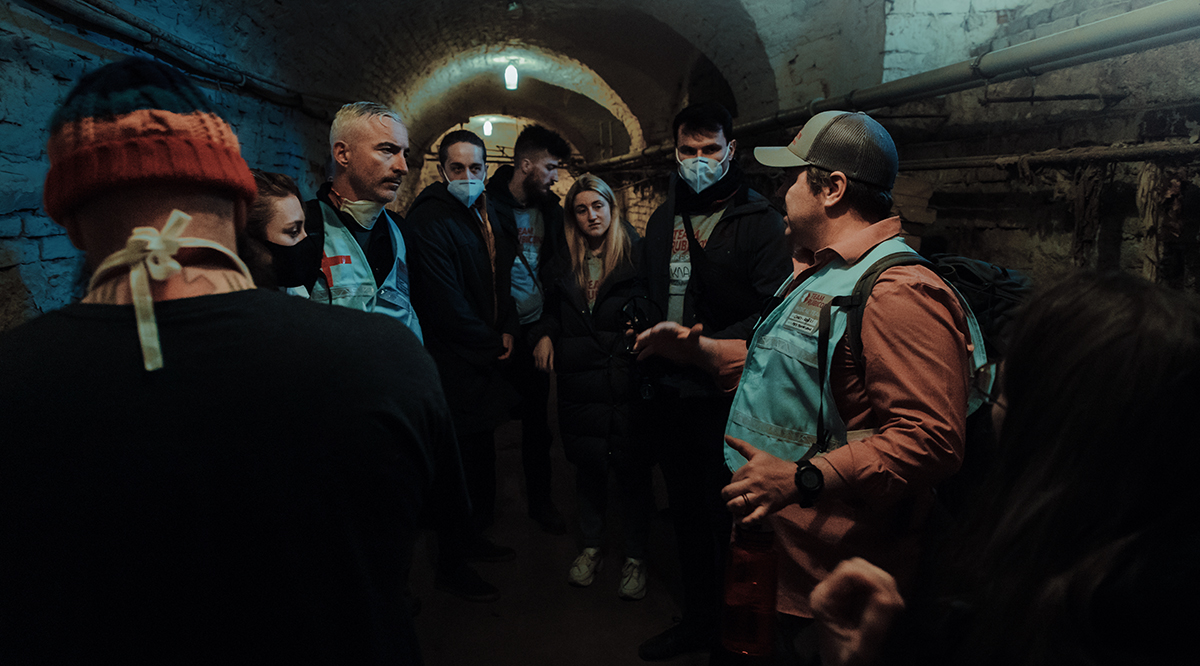
For Erica Nelson, MD, the most difficult moments involved the children.
“[Local families] join us in the bunker during air raids,” she noted, speaking last month from an undisclosed location in Ukraine where she was volunteering to provide health care. “There’s a little girl who comes with her parents night after night. She’s only about two. Every single night she cries,” said Nelson, who usually works as an emergency medicine physician at Brigham and Women’s Hospital in Boston.
“It breaks my heart to see this little girl afraid and not able to understand what’s happening. And I cannot imagine being her parents.”
Like other volunteers with the nonprofit disaster organization Team Rubicon, Nelson delivered emergency and urgent primary care to dozens of displaced persons. The U.S.-based group sends first responders, military veterans, and health care professionals — often from academic medical centers — to provide medical aid in dire conditions. Since early March, more than 50 volunteers have served in Ukraine, Poland, and Hungary, helping the wounded and displaced.
Nelson, now back home, captures the sentiments of many when she shares her motivation for volunteering. “There is some part of me that demands I go where I can help the most,” she says. “This is what gives me purpose.”
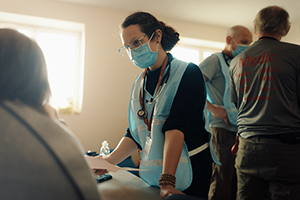
As the war in Ukraine rages on, dozens of U.S. clinicians, medical schools, teaching hospitals, and future physicians are determined to contribute in any way they can.
Some volunteers are able to deliver hands-on help. Others are working to send tons of sorely needed supplies and to provide medical expertise from afar.
The need is dramatic: Since Russia invaded Ukraine on February 24, thousands of civilians have been injured or killed, and some 11 million have fled their homes. More than 100 health care facilities have been attacked.
“Entire cities like Mariupol are a wasteland,” says Andrey Zinchuk, MD, MHS, an assistant professor at Yale School of Medicine in New Haven and a leader of an effort there to provide medical supplies. “Every day feels like a funeral,” says Zinchuk. “It’s shocking and devastating. I cannot just sit and do nothing.”
Serving on the ground
Several U.S. and international organizations are collaborating with the Ukrainian Ministry of Health to provide hands-on care to those whose lives have been ravaged by the war.
Team Rubicon, for example, has volunteers in more than 15 locations in Ukraine as well as several in Hungary plus a logistics team in Poland. The organization generally brings along everything its volunteers need to provide care to refugees and displaced persons.
The organization’s doctors, nurses, and technicians help with everything from wound treatment to chronic disease management.
“We treat people with chronic lung disease who are existing in shelters that don’t have good ventilation or electricity for their nebulizers, for example,” says Nelson. “Some patients may have lost their medications or have skin infections.”
“We might be working in a school, or in a big community center where hundreds of people are sleeping, eating, and living. It may be dirty or cramped. It’s always loud,” she adds.
Given the many challenges involved, experts urge volunteering providers to work only through established organizations. “We don’t want people to just show up,” says Janis Orlowski, MD, AAMC chief health care officer. “We want to make sure they are contributing in ways that make the most sense, such as through groups like the World Health Organization and Doctors Without Borders. These groups are experienced in logistics for supplies and personnel, diplomacy, and emergency response in devastated areas. They also provide the training required so that volunteers become part of the solution and not a problem in an unfamiliar area.”
For example, Penn Medicine has partnered with Global Response Management, a U.S. veteran-led nonprofit, to help deploy interested staff members. Penn will provide logistical support — transportation and fitness-for-duty assessments, for example — and volunteers can spend anywhere from seven to 90 days treating refugees in Poland.
For Team Rubicon, preparing to deploy volunteers included sending an advance team to perform an on-the-ground assessment, explains the group’s chief medical officer, David Callaway, MD, MPA.
“Sure, there’s trauma care, but there’s much more to understanding the problem set,” says Callaway, a professor of emergency medicine at Carolinas Medical Center in Charlotte, North Carolina.
“One [issue] is the millions of displaced people. When you cram all these people into trains or a gymnasium, you create a significant risk of spreading COVID, tuberculosis, and other infectious diseases,” he says. The organization therefore partnered with local providers to identify possible solutions, including hygiene and testing measures.
Callaway also has to worry about ensuring the safety of Team Rubicon health care providers. For that, the group uses high-tech tools like personal tracking devices plus trainings on such topics as how to travel safely in convoys. And his staff stand ready to rapidly facilitate the return of any volunteer who feels too unsafe to stay in the embattled region.
During deployment, some U.S. providers also offer education in crucial medical skills.
Volunteers from the nonprofit Global Surgical and Medical Support Group (GSMSG) have been training Ukrainian civilians on how to cope with the kinds of wounds that can occur during a missile strike.
“It’s a one-day course on how to handle massive bleeding, head injuries, airway issues — all the basics of how to save a life,” says Aaron Epstein, MD, who launched GSMSG in 2015 to dispatch military and medical experts to provide health care training to populations in need. So far, the group’s roughly 50 volunteers in Ukraine have trained some 4,000 civilians.
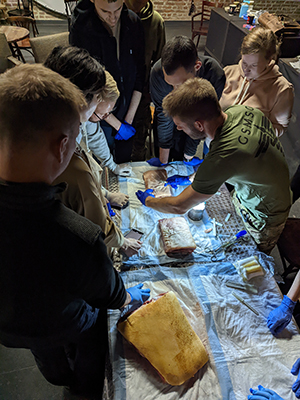
Other GSMSG efforts focus on preparing providers who likely never learned to handle wartime injuries.
One grim concern is the possibility of biological or chemical attacks. GSMSG trainings therefore show emergency medical responders how to use fire hoses to decontaminate large numbers of people quickly. “We also train them how to triage patients, how to know if someone is still contaminated,” says Epstein, who is a University at Buffalo (UB) Jacobs School of Medicine and Biomedical Sciences surgical resident.
Such work is not easy, he adds. “Many people want to help. We’ve gotten thousands of applications to join our team. But very few are equipped with the necessary training and are psychologically ready for the reality of what’s involved.”
Providing help from the U.S.
Health care professionals in Ukraine and surrounding countries are dealing with more — and more difficult— cases than ever before. And they’re frequently doing so under severely limited conditions.
U.S. providers therefore are stepping up to help through a range of remote supports.
Several telehealth projects allow U.S. physicians to provide remote care that ranges from addressing injuries to assessing the need for a potentially dangerous trip to a hospital.
Svetlana Blitshteyn, MD, who like dozens of other providers has volunteered with Telehealth Without Borders, recalls one recent case.
“A woman in Kharkiv was hiding in a bomb shelter with her husband, who was suddenly having trouble speaking and feared he was losing his mind,” says Blitshteyn, a UB associate professor of neurology.
Blitshteyn concluded that the man might be having small strokes, a possible warning of a larger one to come. “I reassured her he was not losing his mind and asked her if there was a Red Cross nearby and she said yes. I told her to go get aspirin for him. ‘If he’s truly having small strokes, a daily aspirin could save his life,’” she says.
Other experts are working to connect doctors in Ukraine with teleconsultations to help them handle care they may not usually provide. “We have 70-plus volunteers from many different specialties represented. The response here has been amazing,” says Jarone Lee, MD, MPH, who is spearheading an effort at Boston’s Mass General Hospital, where he directs the department of surgical critical care. And the Ukrainian Medical Association of North America is getting ready to launch a teleradiology program to alleviate the burden on Ukrainian hospitals trying to read massive amounts of x-rays and other images.
Another possibility institutions are exploring is bringing patients to the United States. “The AAMC has been in regular contact with NATO’s health group to develop a coordinated plan to triage patients first to the excellent health care institutions in the EU [European Union] for both acute and chronic care and then to the UK [United Kingdom], Canada, and the United States if those resources become strained,” says Orlowski. “We stand ready to help should the need arise.”
Meanwhile, many U.S. providers are focused on addressing the terrible emotional toll of living amid fear and devastation.
Experts at the School of Medicine at the Uniformed Services University (USU) in Bethesda, Maryland, are leading regular teleconferences for providers in Ukraine and surrounding countries who are struggling to treat such issues as anxiety and insomnia.
They’ve also translated more than a dozen mental health resources for patients and providers into several languages spoken in the region. Topics include how to handle an acute stress reaction — rage, for example — that might prevent someone from being able to protect themselves in dangerous situations.
“When people are in difficult conditions, their ability to learn is limited, so the simpler the resources, the better,” says Joshua Morganstein, MD, deputy director of USU’s Center for the Study of Traumatic Stress.
Such help is sorely needed. “We’re seeing a lot of mental health issues — mothers and women who have lost their husbands, partners, and sons. They’re on the front lines and dying while the women may have five kids and are all by themselves,” says Nelson. “And they don’t know what’s going to happen next.”
Sending supplies
Numerous medical schools and teaching hospitals across the United States have been providing Ukrainians with literally tons of crucial supplies.
In Baltimore alone, Johns Hopkins Medicine and the University of Maryland Medical System are donating $4 million worth of medical supplies: personal protective equipment, medical air compressors, syringes, respirator kits — even hospital beds.
At Yale School of Medicine, United for Ukraine identifies needs through physicians in Ukraine and then orders items from Eastern European companies to expedite delivery. Some of the funds come from an unusual source: the kitchen of Irina Esterlis, PhD, a Yale medical school associate professor of psychiatry. Esterlis, a native of Ukraine, has been baking loaves of a traditional poppyseed bread in exchange for donations. “Before I started baking, I would just cry and cry,” says Esterlis, who asks for $100 per loaf.
U.S. medical students across the country have also dedicated themselves to providing sorely needed items.
In one of the larger efforts, Stanford University School of Medicine students — together with many other Stanford students and multiple nongovernmental organizations — have managed to collect more than $3.5 million worth of medical supplies.
So far, the group has shipped two planeloads filled with such items as IV kits, surgical instruments, and insulin thanks to “herculean” logistics, says third-year medical student Joshua Pickering.
“We were all working on this about 20 hours a day. It took countless phone calls, emails, and Zoom meetings with Ukrainian officials and others,” he says. Then Pickering, a U.S. Navy veteran, traveled to Ukraine to help facilitate delivery. “I went to help solve problems that might arise, but some of what I wanted was just to show Ukrainians that Americans care.”
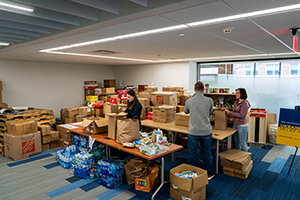
At the Carle Illinois College of Medicine in Champaign, student volunteers have focused on basic needs, collecting 10 tons of canned food, baby supplies, tents, blankets, and other items, explains Kaden Rawson, a first-year student.
Like others involved with such efforts, Rawson feels personally invested. Before starting college, he spent two years volunteering in Russia, in part aiding Ukrainian refugees displaced by earlier fighting.
“People there feel like family to me,” he says. “I couldn’t just stare at my textbooks or attend lectures anymore. As a student, and as a collection of students, I realized this was our time to act.” The efforts have paid off, he says. “I can’t tell you how overwhelmed I am with gratitude by the response and the support for Ukraine we’ve seen.”
